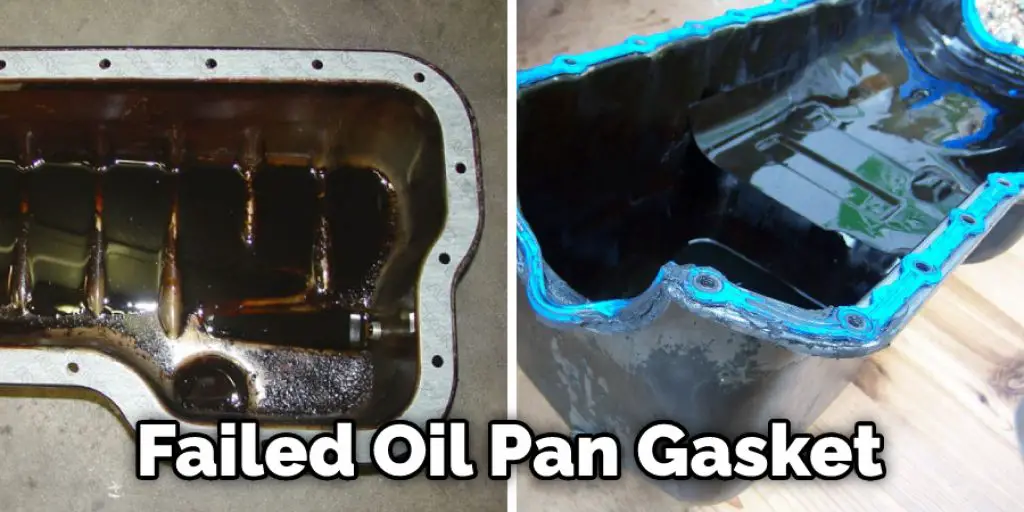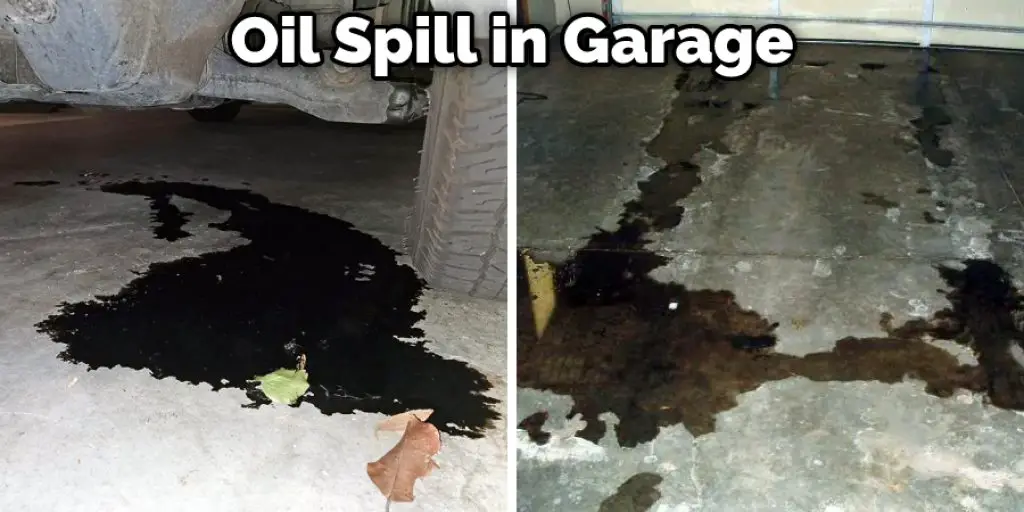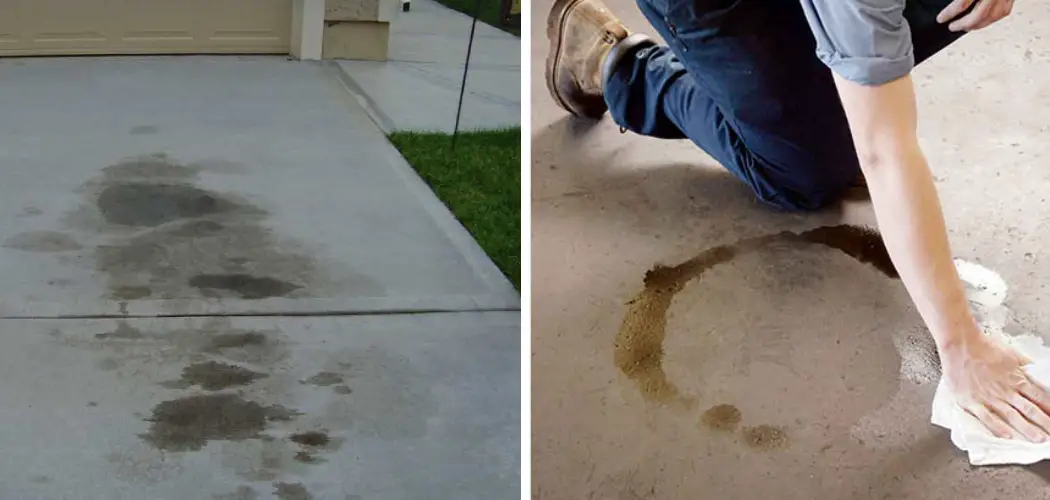If you’ve ever spilled oil on your garage floor, you know how difficult it can be to clean up. The oil stains the concrete, but it also creates a slick surface that’s dangerous to walk on. The good news is there are a few simple steps you can follow to get that oil off your floor and make your garage look like new again.

In this post, we’ll share some tips for how to get oil off garage floor. So whether you’ve got a small spot or a large stain, we’ll help you get rid of it. Just follow our simple tips, and you’ll have your floor looking good as new in no time. Read on to know more information.
Why is it Important to Clean Oil Stains on the Garage Floor?
Besides the obvious reason for wanting your garage to look clean and tidy, there are other important reasons for getting oil off your garage floor. These include:
Preventing Slips and Falls:
As mentioned earlier, oil on a concrete surface creates a slick surface that is slippery and can cause falls. This is not only dangerous for you but also for anyone else who may enter your garage. By cleaning oil stains, you can prevent accidents from occurring.
Protecting Your Concrete Floor:
Oil can cause discoloration and damage to your concrete floor over time. The longer the oil sits, the more it will penetrate into the pores of the concrete, making it harder to remove. By cleaning up oil spills immediately, you can protect your garage floor and prolong its lifespan.
Maintaining a Clean and Organized Space:
A clean garage is not only visually appealing but also makes it easier to find things and work on projects. By getting oil off your garage floor, you can maintain a clean and organized space, making it more pleasant to spend time in.
Materials and Tools Needed:
Absorbent Materials Such as Kitty Litter, Sawdust or Baking Soda:
These materials work to absorb the oil from the surface of the concrete, making it easier to clean.

Dish Soap or Degreaser:
Dish soap or degreaser helps to break down and remove the oil from the concrete surface.
Scrub Brush:
A stiff-bristled scrub brush will help to agitate and loosen up the oil stain for easier removal.
Hot Water:
Hot water can help to loosen up the oil and make it easier to clean.
Pressure Washer (Optional):
If you have a larger or more stubborn oil stain, a pressure washer can be useful in removing it. However, if you don’t have access to one, the other materials and tools should suffice.
Five Common Reasons That Cause Oil Leaks on Garage Floors:
1. Worn or Damaged Oil Seals:

The most common reason for oil leaks is worn or damaged seals. Over time, these seals can become hard and brittle, causing them to crack and break. This can allow oil to seep out, leading to an oily mess on your garage floor.
2. Loose Oil Drain Plug:
Another common cause of oil leaks is a loose oil drain plug. This can occur if the plug is not tightened properly or becomes loose over time. If the plug falls out completely, the oil will leak onto the garage floor.
3. Faulty Oil Pump:
A faulty oil pump can also cause oil leaks. This can be due to several factors, including age, wear and tear, or damage. If the pump is not functioning properly, it may not be able to supply enough oil to the engine, causing it to leak.
4. Worn Engine Parts:
Worn engine parts can also cause oil leaks. Over time, engine parts can become worn down, causing them to lose their seal. This can allow oil to seep out, causing a leak. If you have an older car with many miles on it, it’s essential to check the engine for any signs of wear and tear. If you notice any worn engine parts, you may need to replace them to stop the oil leaks.
5. Failed Oil Pan Gasket:
A failed oil pan gasket is another common cause of oil leaks. This gasket seals the oil pan to the engine block and keeps oil from seeping out. Over time, the gasket can deteriorate and cause a leak. You’ll usually notice an oil leak when you see oil on the ground under your car. If you think you have a failed oil pan gasket, have a mechanic check it out as soon as possible.
10 Ways on How to Get Oil Off Garage Floor:
1. Try Using a Vacuum Cleaner:
One of the most efficient ways to remove oil from a garage floor is using a vacuum cleaner. Use a wet/dry vacuum cleaner to suck up the oil and then dump the contents in a designated hazardous waste area. This method is ideal for small oil spills. You can also sprinkle some kitty litter or baking soda on the stain before vacuuming to absorb more oil.
2. Use WD-40:
Another popular way to get oil off a garage floor is WD-40. Spray it onto the oil and let it sit for a few minutes to break down the oil. Once it has had time to work, wipe it up with a paper towel or rag. You may need to repeat this process a few times for particularly stubborn stains. It’s also essential to clean up the WD-40 residue afterward to avoid it becoming slippery.
3. Use a Soft Cloth:
You don’t want to use a harsh brush that could potentially damage the surface of your garage floor. Instead, grab a soft cloth and dip it in the soapy water before wiping away the oil. Make sure to wring out the cloth before you start cleaning so that you don’t end up with a puddle of water on your floor.
4. Rinse and Dry:
Once you’ve removed the oil from the floor, rinse it with clean water and then dry it off with a towel or rag. This will prevent any leftover oil from staining the floor and help get rid of any lingering smells.
Removing oil from a garage floor can be challenging, but it’s not impossible. By following the steps listed above, you should be able to get the job done in no time. Just be sure to stay patient and take your time, and you’ll be good to go!
5. Try Borax:
If the oil is particularly stubborn and doesn’t seem to be coming up no matter what you do, it might be time to bring out the big guns. Borax is a natural mineral that is often used as a laundry detergent booster, but it can also be effective at removing oil from surfaces. First, mix borax with water until it forms a paste, then spread it over the oil stain and let it sit for a few hours. After that, scrub the area with a brush or sponge and rinse it away with warm water.
6. Use a Broom to Sweep Up the Oil:
Once you have the majority of the oil up, use a broom to sweep it into a pile. You can then either shovel it up, dispose of it, or pour it into a container for later disposal. Avoid touching the oil with your hands, as it can be harmful if ingested. It’s important to properly dispose of the oil and not pour it down any drains or onto the ground.
7. Use an Absorbent Material:
If you don’t have a broom or shovel, you can use an absorbent material to soak up the oil. This can be something as simple as rags or paper towels. Place the absorbent material over the oil and wait a few minutes for it to soak in. Once it’s saturated, remove the material and dispose of it properly. You may need to use multiple absorbents to remove all of the oil.
8. Cover the Stain:
Once you’ve removed as much oil as possible, it’s time to cover the remaining stain. This will help prevent the oil from seeping into the concrete and making the stain permanent. You can use various materials for this, including sand, kitty litter, or flour. Spread a generous amount of your chosen material over the stain and let it sit for at least 24 hours.
9. Use Hot Water and Soap:
This is one of the most common methods for getting oil off a garage floor. Mix hot water and soap in a bucket, and mop the area with the solution. The hot water will help loosen the oil, while the soap will help to lift it from the surface. You may need to repeat this process a few times for particularly tough stains.
10. Try Using a Carpet Cleaner:
If all of the methods above have failed, your last resort may be to try using a carpet cleaner. This method can be a little messier and more time-consuming than some of the others, but it can successfully remove oil from your garage floor. Make sure to read the instructions on your carpet cleaner carefully before using it, and be sure to test it on an inconspicuous area of your floor first to make sure it doesn’t damage the surface.
Some Helpful Tips to Prevent Oil Leaks on Garage Floor:
Here, we have given tips on how to get oil off garage floor and prevent leaks in the future.
- Inspect your car regularly for leaks. Check under the hood and the car for any sign of an oil leak.
- If you see any leaks, take your car to a mechanic to have it repaired as soon as possible.
- Make sure to change your oil regularly. This will help to prevent oil leaks.
- When you change your oil, be sure to use the proper type of oil for your car.
- If you notice an oil leak on your garage floor, clean it up as soon as possible.
- Use a detergent designed for cleaning up oil spills to clean the affected area.
- Rinse the area well with water to remove all traces of the detergent.
- If the oil stain is still visible, you may need to use a stronger cleaner. Look for one specifically designed for removing oil stains.
- Always dispose of used oil and other hazardous materials properly. Do not pour them down drains or onto the ground.
- Regularly check your oil pan and gasket for any signs of wear or damage. If you notice any issues, have a mechanic replace them before they cause a leak.
- Be mindful of where you park your car in the garage. If possible, avoid parking over any cracks or joints in the floor that could potentially cause oil to leak through.
- Consider using a garage floor mat or absorbent pads under your car to catch any potential leaks.
By following these tips and regularly maintaining your car, you can help prevent oil leaks on your garage floor and avoid the hassle of cleaning them up in the future.
Why Should You Get Oil Off Garage Floor?
If you have an oil spill in your garage, it’s important to clean it up as soon as possible. It is a safety hazard, but it can also damage your garage floor. Oil can seep into the cracks in your garage floor and cause it to deteriorate over time. In addition, oil can create a slick surface that’s dangerous to walk on. Fortunately, there are several ways to get oil off of a garage floor.
The most effective way to clean up an oil spill is to use a commercial solvent. These solvents are designed to dissolve oil and grease, and they can quickly remove the stain from your garage floor. However, these solvents can be expensive, and they can also be harmful if you’re not careful. If you use a commercial solvent, follow the instructions carefully and wear gloves and a mask to protect yourself from fumes.
Frequently Asked Questions:
Q: Can I Use a Pressure Washer to Get Oil Off of My Garage Floor?
A: Yes, you can use a pressure washer to clean up an oil spill. However, be careful not to blast the oil into the cracks in your garage floor. You may also want to use a degreaser or detergent in conjunction with the pressure washer for maximum effectiveness. It’s also important to check the instructions on your pressure washer and adjust the settings accordingly.
Q: How Can I Prevent Oil Leaks From Happening in the First Place?
A: The best way to prevent oil leaks is to regularly maintain your car and address any issues as soon as they arise. This includes checking for leaks, changing the oil regularly, and using the correct type of oil for your car. Additionally, be mindful when working on your car in the garage and ensure that all containers are properly sealed before storing them. You can also place a drip pan or absorbent material under your car to catch any potential leaks.
Q: What Should I Do If the Oil Spill Has Already Seeped Into Cracks in My Garage Floor?
A: If oil has seeped into cracks in your garage floor, it’s important to clean it up as soon as possible. You can try using a commercial solvent or a pressure washer with a degreaser, but if those methods don’t work, you may need to call a professional to properly seal the cracks and prevent further damage. It’s important to address this issue promptly as it can lead to more extensive and costly repairs in the future.
Q: Is There a Way to Remove Set-In Oil Stains From My Garage Floor?
A: Yes, there are several methods for removing set-in oil stains from garage floors. One method is to use a mixture of baking soda and white vinegar, applied directly to the stain and left for 30 minutes before scrubbing and rinsing with warm water. Another method is using a paste of equal parts water, cornstarch, and dish soap, applied to the stain and left for 30 minutes before wiping away with a damp cloth. If these methods do not work, you may need to use a commercial degreaser or seek professional help.
Conclusion:
While there are many commercial and homemade solutions to removing oil from a garage floor, the most effective way to remove all of the oil is by using an industrial-strength degreaser. We hope this blog post has been helpful in giving you some guidelines on how to get oil off garage floor. As you can see, there are a few different ways to get oil off of a garage floor.
All of them involve some effort on your part, but the results will be worth it. If you have a large spill, it is best to call a professional remediation company to clean up the mess. However, if you only have a small spot, these tips should help you get the job done quickly and easily. Which method do you plan to use? Let us know in the comments below!
You May Also Read: How to Install a Floor Drain in an Existing Garage

